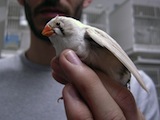Romain Guerreiro’s PhD thesis
 Oxidative stress, senescence and adaptive trade-offs through age in birds
Oxidative stress, senescence and adaptive trade-offs through age in birds
Defended on the 14th December 2012
Funding: ministry grant
Supervisor: Bruno Faivre
Started in October 2008
Abstract
The study of mechanisms involved in senescence and of the adaptive trade-offs between different functions through age are of a crucial interest from a fundamental and functional point of view. My research couples descriptive and experimental approaches to try to determine how different components of redox balance, an indication of oxidative stress, are modified by age. I am also interested in the influence of environmental conditions (particularly at early stage) on these components. Some of these components (particularly antioxidant defences) have multiple biological functions and are thus involved in trade-offs between physiological functions. I will consider the influence of age on such adaptive trade-offs. The aim of this subject is to explore certain mechanisms of senescence from an evolutionary point of view. This is particularly interesting in birds, the mechanisms for whose longevity are still very unclear. This work aim to highlight some fine and still much neglected mechanisms that affect oxidative stress and its roles in senescence, and the adaptive nature of some physiological trade-offs linked to oxidative stress.
This PhD project aims to examine, in birds, (i) the modification through age of different components of oxidative stress, and their possible links with senescence and longevity and (ii) their possible relation along life, in terms of trade-offs, with certain life history trade-offs directly involved in micro-evolutionary processes. It combines descriptive and experimental approaches on cohorts of different ages, and longitudinal monitoring of cohorts through time. Experimental control of environmental conditions and of individual’s investment in certain functions (like reproduction for example) will be easily attainable. The main species studied will be the Zebra Finch (Taeniopygia guttata), a small passerine with a maximum longevity reaching 5 years. Access to all possible age classes during this work will be possible on reconstructed cohorts but also on monitored individuals (longitudinal approach). We plan to evaluate oxidative stress, using 3 crucial parts methods: (i) antioxidant defences, (ii) the control of free radical production and (iii) the balance between antioxidant defences and production of free radicals.
To summarise, the aim of this project is to combine the study of oxidative stress, senescence and longevity, and attempt to isolate key stages in an individuals’ life and to assess possible trade-offs of key resources (antioxidant components) between anti-oxidative defences and other important biological functions during life.
Keywords
senescence, oxidative stress, redox balance, trade-offs, life history traits, longitudinal approach
PhD Committee
Thierry Boulinier, chargé de recherche CNRS, CEFE (Centre d’écologie fonctionnelle et évolutive), UMR 5175, Montpellier, France
Gabriele Sorci, directeur de recherche CNRS, université de Bourgogne, laboratoire Biogéosciences, UMR 5561, Dijon, France
- extrait:
- lien_externe:
- kc_data:
- a:8:{i:0;s:0:"";s:4:"mode";s:0:"";s:3:"css";s:0:"";s:9:"max_width";s:0:"";s:7:"classes";s:0:"";s:9:"thumbnail";s:0:"";s:9:"collapsed";s:0:"";s:9:"optimized";s:0:"";}
- kc_raw_content:
 Oxidative stress, senescence and adaptive trade-offs through age in birds
Oxidative stress, senescence and adaptive trade-offs through age in birdsDefended on the 14th December 2012
Funding: ministry grant
Supervisor: Bruno Faivre
Started in October 2008
Abstract
The study of mechanisms involved in senescence and of the adaptive trade-offs between different functions through age are of a crucial interest from a fundamental and functional point of view. My research couples descriptive and experimental approaches to try to determine how different components of redox balance, an indication of oxidative stress, are modified by age. I am also interested in the influence of environmental conditions (particularly at early stage) on these components. Some of these components (particularly antioxidant defences) have multiple biological functions and are thus involved in trade-offs between physiological functions. I will consider the influence of age on such adaptive trade-offs. The aim of this subject is to explore certain mechanisms of senescence from an evolutionary point of view. This is particularly interesting in birds, the mechanisms for whose longevity are still very unclear. This work aim to highlight some fine and still much neglected mechanisms that affect oxidative stress and its roles in senescence, and the adaptive nature of some physiological trade-offs linked to oxidative stress.
This PhD project aims to examine, in birds, (i) the modification through age of different components of oxidative stress, and their possible links with senescence and longevity and (ii) their possible relation along life, in terms of trade-offs, with certain life history trade-offs directly involved in micro-evolutionary processes. It combines descriptive and experimental approaches on cohorts of different ages, and longitudinal monitoring of cohorts through time. Experimental control of environmental conditions and of individual’s investment in certain functions (like reproduction for example) will be easily attainable. The main species studied will be the Zebra Finch (Taeniopygia guttata), a small passerine with a maximum longevity reaching 5 years. Access to all possible age classes during this work will be possible on reconstructed cohorts but also on monitored individuals (longitudinal approach). We plan to evaluate oxidative stress, using 3 crucial parts methods: (i) antioxidant defences, (ii) the control of free radical production and (iii) the balance between antioxidant defences and production of free radicals.
To summarise, the aim of this project is to combine the study of oxidative stress, senescence and longevity, and attempt to isolate key stages in an individuals’ life and to assess possible trade-offs of key resources (antioxidant components) between anti-oxidative defences and other important biological functions during life.
Keywords
senescence, oxidative stress, redox balance, trade-offs, life history traits, longitudinal approach
PhD Committee
Thierry Boulinier, chargé de recherche CNRS, CEFE (Centre d’écologie fonctionnelle et évolutive), UMR 5175, Montpellier, France
Gabriele Sorci, directeur de recherche CNRS, université de Bourgogne, laboratoire Biogéosciences, UMR 5561, Dijon, France
